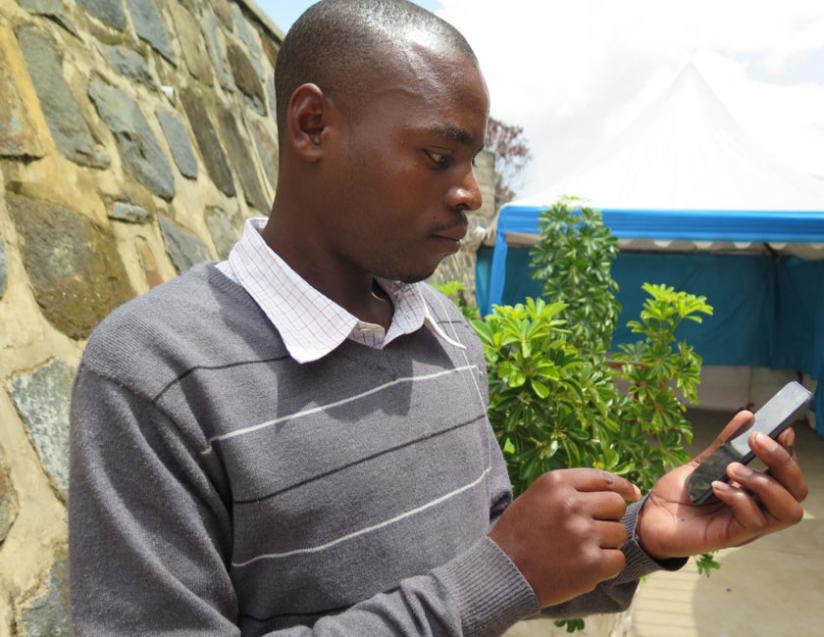Portable smart devices are facilitating the improvement of teachers' skills and easing the transfer of knowledge to pupils in primary schools in rural areas.


Portable smart devices are facilitating the improvement of teachers’ skills and easing the transfer of knowledge to pupils in primary schools in rural areas.
Teachers and heads of schools have told The New Times that the use of current technologies, mainly small portable smart devices, has "transformed the work environment” by easing access to education content, facilitating peer-to-peer learning, exchange of skills and experiences as well as transfer of knowledge.
One of the programmes that are seeking to exploit current technologies to transform the primary teaching environment is the Teacher Self-Learning Academy (TSLA), a project that is helping improve the quality of teaching and learning in sciences and English using cost effective and innovative technologies in Bugesera and Nyaruguru districts.
Under the project being implemented by Plan International, a child rights organisation, in partnership with the Ministry of Education, teachers at selected schools received portable smart devices which were uploaded with varied content, including audio, video and texts that they use in their teaching.
In its pilot phase, which started early this year and is scheduled to end in March 2015, 160 P5 and P6 English and Science teachers from 32 selected schools received iPods loaded with audio-visual instructional materials.
The contents were produced using model teachers from selected primary schools across the country to help inspire teachers in rural settings who mainly rely on personal skills.
By watching lessons prepared by model tutors, the targeted teachers replicate the learner-centred methodology and have access to innovative supplementary learning manual, both teachers and officials say.
Text materials, including dictionaries with audio English words pronunciations have also been uploaded to familiarise with English as a medium of instruction adopted after many years of using French.
Teaching improved
Silas Bahigansenga, TSLA project manager, says the initiative seeks to improve learning outcomes by improving the quality of teaching and learning in Science and English.
"We believe someone fully equipped with skills can teach well,” Bahigansenga says of how the programme is benefiting both students and teachers.
"With these devices, teachers are able to move with their training materials. Besides, learning through audio-visual content is easier and more attractive,” he adds.
The programme is credited, among others, to have helped primary teachers to master English as a language of instruction.
Alphonse Munyaneza, an English teacher at Munege Primary School in Nyaruguru District, says he has been using a mixture of English and Kinyarwanda.
"When you can’t speak and pronounce words rightly, you can’t expect students to be better,” Munyaneza says.
Munyaneza says the devices have allowed him a room for self-study and evaluation which has helped improve his teaching skills.
"I now possess the skills and confidence to help transfer knowledge to my students,” he says.
"From the materials on the smart devices, I have learnt new words, right pronunciation and improved from teacher-centred to learner-centred teaching methodology,” says Marie Ange Twagiramariya, a Science and Elementary Technology teacher at Mbasa Primary School in Kibeho Sector.
For Christine Mushimiyimana, the headmistress of Gihemvu Primary School in the rural Nyabimata Sector, the content delivered through the smart devices has helped improve the overall teaching environment.
"The skills and teaching methodologies improved, giving teachers confidence that has helped improve the transfer of knowledge to students,” Mushimiyimana says.
ICTs ‘transformative’
Rwanda has invested a lot of efforts in Information and Communication Technologies, integrating them in several sectors as a driving force for speedy improvement and development.
"Technology is taking a lead in all sectors and education shouldn’t lag behind,” Bahigansenga says.
"Technology helps people learn quickly and easily,” he adds.
Vincentia Nyangoma, the Acting Head of ICTs in Education Department at the Rwanda Education Board (Reb) says portable smart devices are helping improve the quality of education in rural schools.
"They help teachers utilise their time well and learn without the need to carry heavy books,” Nyangoma says.
She says current technologies have greatly contributed to the transformation of the education sector.
"ICTs ease work, improve the teaching function, help in proper time management and open doors for a wider access to varied teaching content,” she says, before adding: "ICTs offer a cost-effective source of knowledge compared to the traditional hard materials.”
editorial@newtimes.corw


